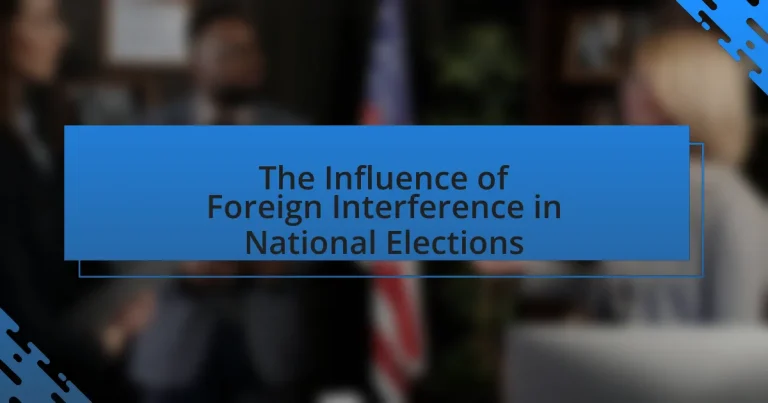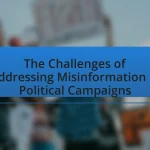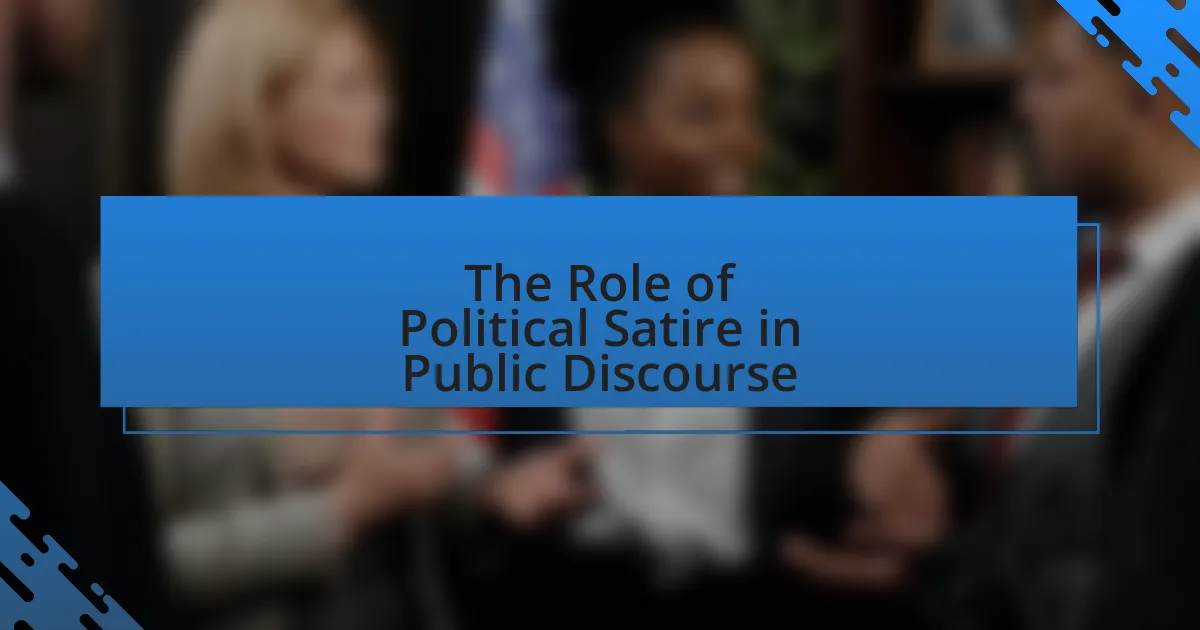The article examines the influence of foreign interference in national elections, highlighting its detrimental effects on democratic processes. It details various methods of interference, including disinformation campaigns, cyberattacks, and financial manipulation, with specific examples such as the 2016 U.S. presidential election. The discussion extends to the implications of such interference for voter trust, election outcomes, and political stability, while also exploring historical instances and strategies for countering these threats. Additionally, the article addresses the evolving landscape of foreign interference in light of emerging technologies and emphasizes the importance of public awareness and robust cybersecurity measures to safeguard electoral integrity.
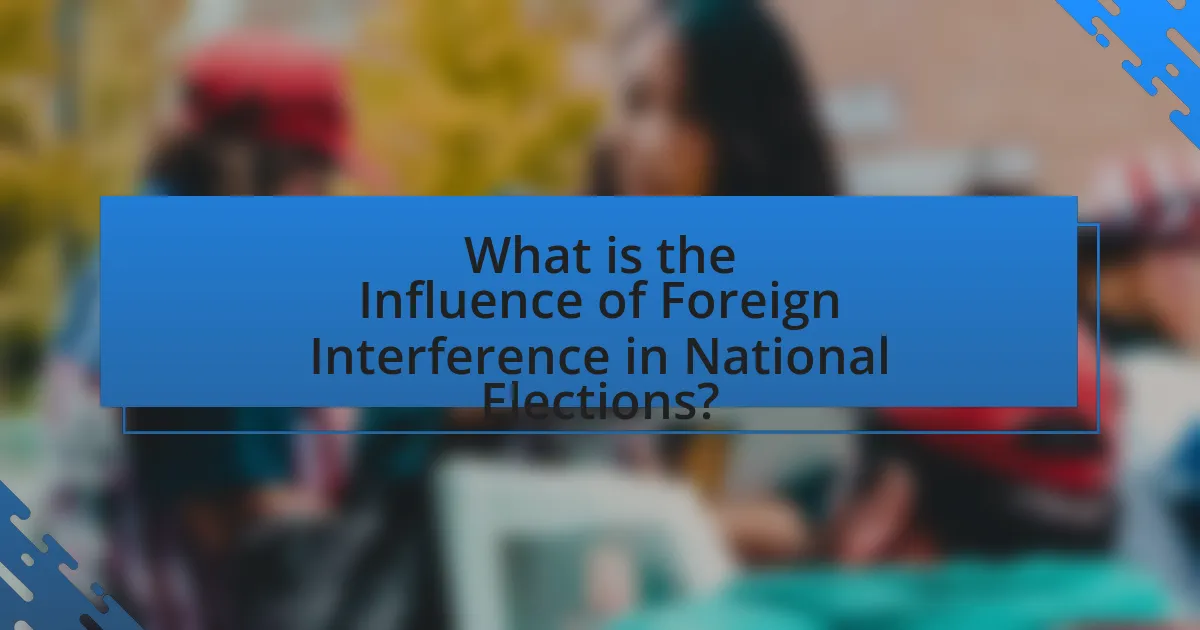
What is the Influence of Foreign Interference in National Elections?
Foreign interference in national elections significantly undermines democratic processes and can alter electoral outcomes. This influence manifests through various means, including disinformation campaigns, cyberattacks, and financial support for specific candidates or parties. For instance, the 2016 U.S. presidential election saw Russian operatives utilize social media to spread false information, which was documented in the report by the U.S. Intelligence Community, indicating a clear intent to sway public opinion and disrupt the electoral process. Additionally, a study by the Oxford Internet Institute found that foreign actors frequently engage in coordinated campaigns to manipulate voter perceptions and behavior, further illustrating the detrimental impact of such interference on the integrity of elections.
How does foreign interference manifest in national elections?
Foreign interference in national elections manifests primarily through disinformation campaigns, cyberattacks, and financial support for specific candidates or parties. Disinformation campaigns involve the spread of false information via social media and other platforms to manipulate public opinion, as seen in the 2016 U.S. presidential election where Russian operatives used social media to influence voter perceptions. Cyberattacks target electoral infrastructure, exemplified by the hacking of the Democratic National Committee, which aimed to disrupt the electoral process. Additionally, foreign entities may provide financial backing to candidates or parties that align with their interests, undermining the integrity of the electoral system. These methods collectively threaten democratic processes and can significantly alter election outcomes.
What are the common methods used for foreign interference?
Common methods used for foreign interference include disinformation campaigns, cyberattacks, and financial manipulation. Disinformation campaigns involve spreading false or misleading information through social media and other platforms to influence public opinion and disrupt electoral processes. Cyberattacks target electoral infrastructure, such as hacking into voter databases or election systems to undermine trust in the electoral process. Financial manipulation may involve funding political candidates or organizations to sway elections in favor of foreign interests. These methods have been documented in various instances, such as Russia’s interference in the 2016 U.S. presidential election, where social media disinformation and cyber intrusions were employed to influence voter behavior and perceptions.
How do these methods vary across different countries?
Methods of foreign interference in national elections vary significantly across countries due to differing political systems, regulatory environments, and cultural contexts. For instance, in the United States, foreign interference often involves social media manipulation and disinformation campaigns, as evidenced by the 2016 presidential election where Russian operatives used platforms like Facebook to spread divisive content. In contrast, countries like Germany have stricter regulations on political advertising and data privacy, which limits the scope of foreign influence. Additionally, in authoritarian regimes such as Russia and China, state-sponsored interference may include direct cyberattacks on electoral infrastructure and the suppression of dissenting voices, as seen in the 2020 Russian parliamentary elections where independent candidates faced significant obstacles. These variations highlight how the methods of foreign interference are tailored to exploit specific vulnerabilities within each country’s electoral framework.
Why is foreign interference a concern for national elections?
Foreign interference is a concern for national elections because it undermines the integrity of the democratic process. When foreign entities manipulate or influence elections, they can distort the will of the electorate, leading to outcomes that do not reflect the true preferences of the citizens. For instance, the 2016 U.S. presidential election saw significant interference from Russian operatives who used social media to spread disinformation and sow discord among voters, as documented by the Mueller Report. This type of interference can erode public trust in electoral systems and institutions, ultimately threatening national sovereignty and democratic governance.
What impact does foreign interference have on voter trust?
Foreign interference significantly undermines voter trust by creating perceptions of illegitimacy in electoral processes. Studies, such as the 2018 report by the U.S. Senate Intelligence Committee, indicate that foreign actors, particularly during the 2016 U.S. presidential election, employed disinformation campaigns that led to increased skepticism among voters regarding the integrity of the electoral system. This erosion of trust can result in lower voter turnout and increased polarization, as citizens may feel that their votes are manipulated or devalued by external influences.
How does foreign interference affect election outcomes?
Foreign interference significantly affects election outcomes by manipulating public opinion and undermining democratic processes. For instance, during the 2016 U.S. presidential election, Russian operatives used social media platforms to spread disinformation, which influenced voter perceptions and potentially swayed key demographics. Studies, such as the report by the U.S. Intelligence Community, confirmed that foreign entities aimed to disrupt the electoral process and promote division among the electorate. This manipulation can lead to altered voter behavior, decreased trust in electoral integrity, and ultimately, a shift in the election results.
What historical examples illustrate foreign interference in elections?
Historical examples of foreign interference in elections include the 2016 United States presidential election, where Russian operatives conducted a campaign of disinformation and hacking to influence voter perception and behavior. Additionally, in 1950, the United States intervened in the Italian elections by funding anti-communist parties to prevent a communist victory. Another example is the 1996 Taiwanese presidential election, where China allegedly attempted to sway the outcome by conducting missile tests to intimidate voters. These instances demonstrate the varied methods and motivations behind foreign interference in electoral processes.
What lessons can be learned from past incidents of interference?
Past incidents of interference in national elections reveal critical lessons about the vulnerabilities of democratic processes. One key lesson is the importance of robust cybersecurity measures; for instance, the 2016 U.S. presidential election highlighted how Russian hackers exploited weaknesses in electoral systems, leading to increased awareness and investment in cybersecurity by various governments. Additionally, these incidents underscore the necessity for public awareness campaigns to educate citizens about misinformation tactics, as seen in the manipulation of social media platforms during the same election. Furthermore, establishing clear legal frameworks and international norms regarding foreign interference can help deter future incidents, as demonstrated by the European Union’s response to interference in its member states’ elections.
How have countries responded to foreign interference in the past?
Countries have responded to foreign interference in various ways, including implementing sanctions, enhancing cybersecurity measures, and enacting legislation to protect electoral integrity. For instance, the United States imposed sanctions on Russia following the 2016 presidential election interference, targeting individuals and entities involved in the cyber operations. Additionally, countries like Estonia have invested heavily in cybersecurity to safeguard their electoral systems from external threats, reflecting a proactive approach to mitigate risks. Furthermore, nations such as France have introduced laws that regulate online political advertising and increase transparency to combat misinformation during elections, demonstrating a legislative response to foreign influence.
How can nations protect themselves from foreign interference?
Nations can protect themselves from foreign interference by implementing robust cybersecurity measures, enhancing intelligence capabilities, and promoting public awareness about misinformation. Cybersecurity measures, such as securing electoral systems and critical infrastructure, are essential; for instance, the U.S. Department of Homeland Security has emphasized the importance of securing voting systems against cyber threats. Enhanced intelligence capabilities allow nations to detect and respond to foreign influence operations effectively; the U.S. intelligence community has reported increased foreign interference attempts in recent elections, highlighting the need for vigilance. Additionally, promoting public awareness about misinformation helps citizens critically evaluate information sources, as studies show that informed voters are less susceptible to manipulation.
What role does technology play in mitigating foreign interference?
Technology plays a crucial role in mitigating foreign interference by enhancing cybersecurity measures, improving information verification processes, and facilitating real-time monitoring of digital platforms. Cybersecurity technologies, such as advanced encryption and intrusion detection systems, protect sensitive electoral data from unauthorized access and manipulation, as evidenced by the implementation of these systems in various national elections to safeguard against hacking attempts. Additionally, artificial intelligence and machine learning algorithms are employed to detect and flag disinformation campaigns on social media, helping to maintain the integrity of information shared with the public. For instance, platforms like Facebook and Twitter have developed tools to identify and reduce the spread of false narratives linked to foreign actors. Furthermore, technology enables governments to collaborate and share intelligence on potential threats, enhancing collective defense against foreign interference.
How can cybersecurity measures be enhanced to prevent interference?
Cybersecurity measures can be enhanced to prevent interference by implementing multi-factor authentication, continuous monitoring, and regular security audits. Multi-factor authentication significantly reduces unauthorized access by requiring multiple forms of verification, which has been shown to decrease breaches by up to 99.9% according to Microsoft. Continuous monitoring allows for real-time detection of anomalies and potential threats, enabling swift responses to suspicious activities. Regular security audits help identify vulnerabilities within systems, ensuring that security protocols are up-to-date and effective against evolving threats. These strategies collectively strengthen the cybersecurity framework, making it more resilient against foreign interference in national elections.
What are the best practices for monitoring foreign influence online?
The best practices for monitoring foreign influence online include utilizing advanced analytics tools, establishing clear protocols for information verification, and fostering collaboration among governmental and non-governmental organizations. Advanced analytics tools, such as machine learning algorithms, can identify patterns indicative of foreign influence, while clear protocols ensure that information is accurately assessed before dissemination. Collaboration among various stakeholders enhances the sharing of intelligence and resources, which is crucial for effective monitoring. For instance, the U.S. Department of Homeland Security has implemented strategies that involve partnerships with social media platforms to detect and mitigate foreign disinformation campaigns, demonstrating the effectiveness of these practices in real-world scenarios.
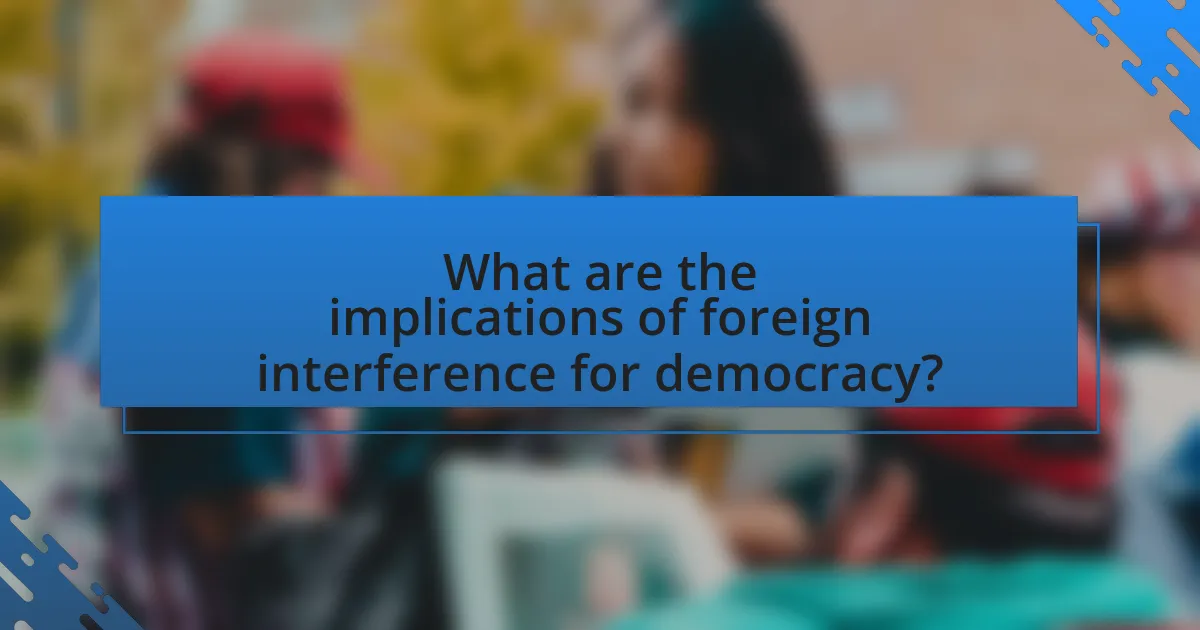
What are the implications of foreign interference for democracy?
Foreign interference undermines democracy by eroding public trust in electoral processes and institutions. This interference can manifest through disinformation campaigns, cyberattacks, and funding of political entities, which distort the democratic discourse. For instance, the 2016 U.S. presidential election saw significant foreign involvement, particularly from Russia, which aimed to influence voter perceptions and sow discord among the electorate. Studies, such as those conducted by the U.S. Senate Intelligence Committee, have documented how these actions can lead to polarization and decreased voter participation, ultimately threatening the integrity of democratic governance.
How does foreign interference challenge democratic processes?
Foreign interference challenges democratic processes by undermining the integrity of elections and eroding public trust in governance. This interference can manifest through disinformation campaigns, cyberattacks, and funding of political entities, which distort the electoral landscape. For instance, the 2016 U.S. presidential election saw Russian operatives utilize social media to spread false information, influencing voter perceptions and behavior. Such actions not only disrupt the fair competition of ideas but also create divisions within society, ultimately threatening the foundational principles of democracy.
What are the long-term effects on political stability?
Long-term effects on political stability include increased polarization, erosion of public trust in institutions, and potential for civil unrest. Foreign interference in national elections often exacerbates divisions within society, leading to a fragmented political landscape where consensus becomes difficult. For instance, studies have shown that countries experiencing significant foreign meddling, such as the United States during the 2016 election, faced heightened partisan conflict and skepticism towards electoral processes. This erosion of trust can destabilize governance, as citizens may question the legitimacy of elected officials and their policies, ultimately resulting in a less stable political environment.
How does foreign interference influence public policy decisions?
Foreign interference influences public policy decisions by shaping the political landscape and altering the priorities of elected officials. For instance, foreign entities may engage in lobbying, funding political campaigns, or disseminating disinformation to sway public opinion and legislative outcomes. A notable example is the 2016 U.S. presidential election, where Russian operatives used social media to influence voter perceptions and policy discussions, ultimately impacting decisions related to foreign relations and national security. This demonstrates how foreign actors can manipulate domestic policy agendas through strategic interventions.
What strategies can be implemented to counter foreign interference?
To counter foreign interference, nations can implement strategies such as enhancing cybersecurity measures, increasing public awareness campaigns, and strengthening legal frameworks. Enhanced cybersecurity measures protect critical infrastructure and electoral systems from hacking and data breaches, as evidenced by the 2016 U.S. presidential election, where cyberattacks targeted voter registration databases. Public awareness campaigns educate citizens about misinformation and disinformation tactics used by foreign actors, which can mitigate the impact of false narratives. Strengthening legal frameworks involves updating laws to address foreign influence in political advertising and social media, as seen in the European Union’s regulations on political advertising transparency. These strategies collectively create a robust defense against foreign interference in national elections.
How can public awareness campaigns help mitigate the effects?
Public awareness campaigns can help mitigate the effects of foreign interference in national elections by educating citizens about the tactics used by foreign entities and promoting critical thinking regarding information consumption. These campaigns can raise awareness about misinformation, disinformation, and the importance of verifying sources, which empowers voters to make informed decisions. For instance, studies have shown that informed voters are less susceptible to manipulation; a 2019 report by the Pew Research Center indicated that 64% of Americans believe that misinformation is a major problem in politics, highlighting the need for awareness initiatives. By fostering a well-informed electorate, public awareness campaigns can reduce the impact of foreign interference on democratic processes.
What role do international coalitions play in addressing interference?
International coalitions play a crucial role in addressing interference by fostering collaboration among nations to share intelligence, establish norms, and implement collective responses. These coalitions, such as NATO and the European Union, facilitate joint efforts to counteract foreign interference in national elections through coordinated cybersecurity measures and public awareness campaigns. For instance, the European Union has developed frameworks like the European Democracy Action Plan, which aims to enhance resilience against disinformation and foreign influence, demonstrating the effectiveness of collective action in safeguarding electoral integrity.
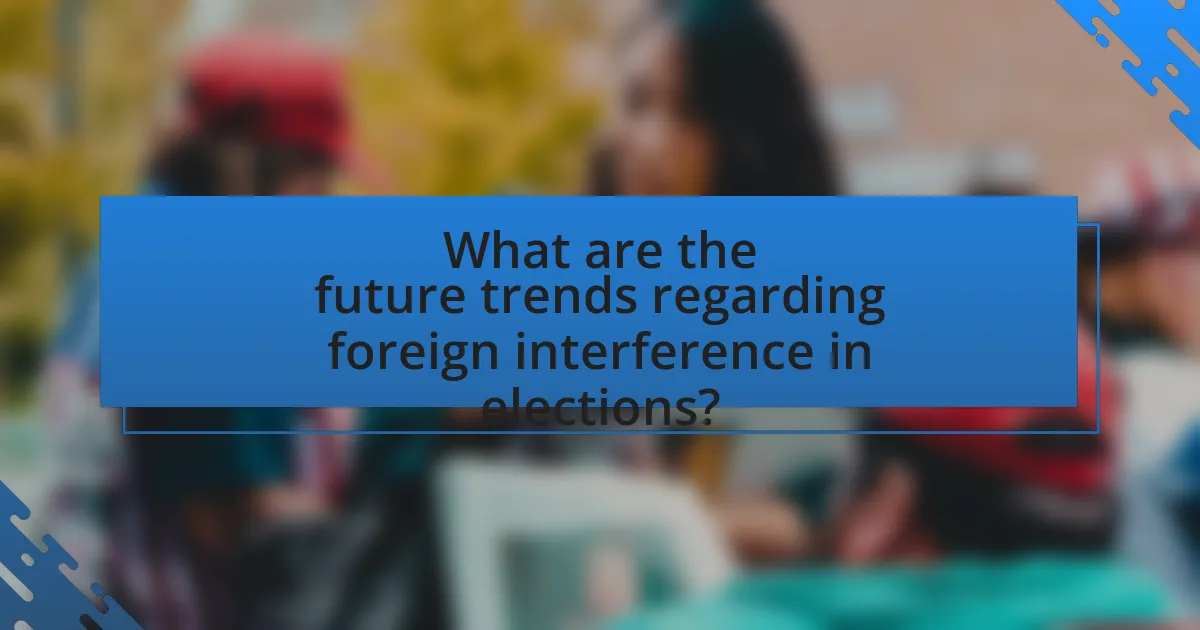
What are the future trends regarding foreign interference in elections?
Future trends regarding foreign interference in elections indicate an increase in the use of advanced technology, particularly artificial intelligence and social media manipulation. As evidenced by the 2016 U.S. presidential election, foreign entities have leveraged social media platforms to spread disinformation and influence public opinion, a tactic likely to evolve with more sophisticated algorithms and targeted advertising. Additionally, the rise of deepfake technology poses a significant threat, as it can create convincing but false narratives that may sway voters. Reports from cybersecurity firms, such as FireEye, highlight that nation-states are expected to enhance their cyber capabilities to disrupt electoral processes and undermine trust in democratic institutions.
How is the landscape of foreign interference evolving with technology?
The landscape of foreign interference is evolving with technology through the increased use of social media platforms and advanced data analytics. These technologies enable foreign actors to target specific demographics with tailored misinformation campaigns, significantly enhancing their ability to influence public opinion and electoral outcomes. For instance, the 2016 U.S. presidential election saw Russian operatives utilize Facebook and Twitter to disseminate divisive content, reaching millions of users and exploiting algorithmic amplification. Additionally, advancements in artificial intelligence allow for the creation of deepfakes and automated bots, further complicating the detection of foreign interference and increasing its potential impact on democratic processes.
What emerging technologies pose new risks for national elections?
Emerging technologies that pose new risks for national elections include artificial intelligence, deepfake technology, and blockchain systems. Artificial intelligence can be used to create sophisticated disinformation campaigns that manipulate public opinion and voter behavior, as evidenced by the use of AI-generated content in the 2016 U.S. presidential election. Deepfake technology allows for the creation of realistic but fabricated videos, which can mislead voters and damage candidates’ reputations, as demonstrated by instances of deepfake videos circulating during various electoral processes. Additionally, while blockchain systems are often touted for their potential to enhance election security, they also introduce risks related to hacking and vulnerabilities in smart contracts, which could compromise the integrity of the voting process.
How can nations adapt to these evolving threats?
Nations can adapt to evolving threats of foreign interference in national elections by implementing robust cybersecurity measures and enhancing public awareness campaigns. Cybersecurity measures, such as advanced threat detection systems and regular security audits, can protect electoral infrastructure from hacking attempts, as evidenced by the increased investment in cybersecurity by countries like the United States, which allocated over $380 million for election security in 2020. Additionally, public awareness campaigns can educate citizens about misinformation tactics, as seen in the European Union’s initiatives to combat disinformation, which aim to foster critical thinking and media literacy among voters. These strategies collectively strengthen the resilience of democratic processes against foreign interference.
What practical steps can citizens take to safeguard their elections?
Citizens can safeguard their elections by actively participating in the electoral process, including voter registration, educating themselves about candidates and issues, and monitoring the voting process. Engaging in voter registration ensures that individuals are eligible to vote, which is crucial for maintaining a representative democracy. Educating oneself about candidates and issues helps voters make informed decisions, reducing the likelihood of manipulation by foreign entities. Monitoring the voting process, such as observing polling places and reporting irregularities, can help detect and deter foreign interference. According to the National Association of Secretaries of State, public vigilance and participation are essential in protecting the integrity of elections.
